John O’Neill, guitarist and main songwriter with The Undertones, gives a rare interview, telling Punktuation about touring with The Clash, writing ‘Teenage Kicks’ and his love for The Velvet Underground.
Since reforming in 1999, The Undertones have toured regularly and released two well-received albums, 2003’s ‘Get What You Need’ and 2007’s ‘Dig Yourself Deep’. Now they’ve a new compilation out, ‘Dig What You Need’, that blends those two discs’ titles and songs for a concise retelling of their sound.
With more shows planned this year than at any time since they got back together, the compilation, its songs remixed, is a timely reminder of how robust their Ramones-influenced punk-pop and garage rock still is. The band still consists of guitarists and brothers John and Damian O’Neill, Michael Bradley on bass and drummer Billy Doherty. Still, it now has Paul McLoone on the microphone to replace original singer Feargal Sharkey.
To find out more about The Undertones’ reformation years, early time together and influences, Punktuation took a break from the seemingly endless Zoom calls and spoke with John O’Neill on the telephone.
Let’s start with the new compilation album. What prompted that?
It was Damian’s idea … they didn’t really get the most publicity when they both came out – Damian came up with the idea of getting them remastered and trying to get them sounding a bit sharper, and [Paul Tipler’s] done a really good job.
I left [choosing the tracks] up to the other four. I didn’t really have any input. I just let the band pick whatever they thought was the best, so there’s maybe a couple of songs I might have chose differently, but most of them are the best, definitely some of the best songs Mickey’s ever written, I think, on that record.

‘Dig What You Need’ compiles your two albums to date. Tell me about them.
We did both those records initially ourselves as if we were back in the punk days, really. We financed it ourselves; it was all recorded in Derry, Derry engineers working on it. So that’s one of the things that I’m proud of doing – we were back to our roots all the way like the ‘Teenage Kicks’ EP was.
Those records had a budget of like £4,000 for each LP. We don’t have a lot of money to pay any more than that, but we were able to get a local studio on there, and it worked out great. I like the first LP more. The second record, the songs that were left of it were most of the songs I wrote. Because, in retrospect, I could have worked longer to make them better probably, but as usual, when you have a deadline to do, you go with what you’ve got at the time.
You’ve penned many punk classics; how do you approach songwriting?
The easy ones write themselves. I’ve got a title in my head, or I start something on the guitar, [and] sometimes the words all flow really easy, and it’s dead simple. I never really have an idea what the song’s going to be about until it’s finished.
I find it difficult to write specifically about something. I’ve tried that before, and it always seems too false or forced, you know. I envy people who can write about things like a love song that’s really about love and stuff like that. If I try writing a love song, it ends up being the opposite – a lot of the music I like tends to be dark, anyway.
The Velvet Underground have always, consistently been my favourite band ever. You know, I’ve always strived to try and write lyrics or sound like Lou Reed or like The Velvets. I’m always trying to write a song as good as ‘Pale Blue Eyes’, and I’ve not stopped.
“I’ve always strived to try and write lyrics or sound like Lou Reed or like The Velvets. I’m always trying to write a song as good as ‘Pale Blue Eyes’, and I’ve not stopped.” John O’Neill, The Undertones.
Tweet
What were your influences when you were just starting out?
To start with, it was The Rolling Stones and also The Beatles as well, but when we were playing live, mostly it was The Rolling Stones songs. And then, as we were getting better, that coincided with the punk just starting. The Ramones LP was a massive influence on us because it was the same chords that we were playing anyway, except done twice as fast, and that was a lightbulb moment for us – it was more fun to play them fast anyway.
I bought the NME religiously every week during the ’70s, and there was a great article of the New York scene that was happening, like ’75, early ’76. Television was mentioned, Blondie, Ramones, Richard Hell and Talking Heads. So you just had to check all that out then. And then discovering The Velvet Underground, The Stooges, New York Dolls, all that stuff was just a revelation, like ‘fuck The Rolling Stones, I’ve got the New York Dolls’.
So, they were all a massive influence, and then the Nuggets compilation was another Bible to us. They were just such fun to do, and that had a big influence on how we wrote songs.

Were the New York punk bands more important to you than the London ones?
It was definitely more so [the New York punk bands] at the start, yeah. [Then it was] the first Clash LP, and The Dammed and the Sex Pistols, that was a big influence, but especially the Buzzcocks. We were probably more into them in the sense that most of my songs were about love or unrequited love, and Pete Shelley was doing similar things, I suppose.
Probably out of all the [UK] punk bands, the Buzzcocks were the biggest influence on us, that poppier end of it.
Was there anyone you would have liked to have worked with first time around?
I always regretted that when we were looking for someone to record us when we got signed, I’m so sorry I never asked the guy who produced those first couple of Wire records [Mike Thorne] because I love the guitar sound on them. Even discovering early Eno records, like Taking Tiger Mountain – those guitar ones that he did for the first two or three LPs, Eno would have been a great choice as well.
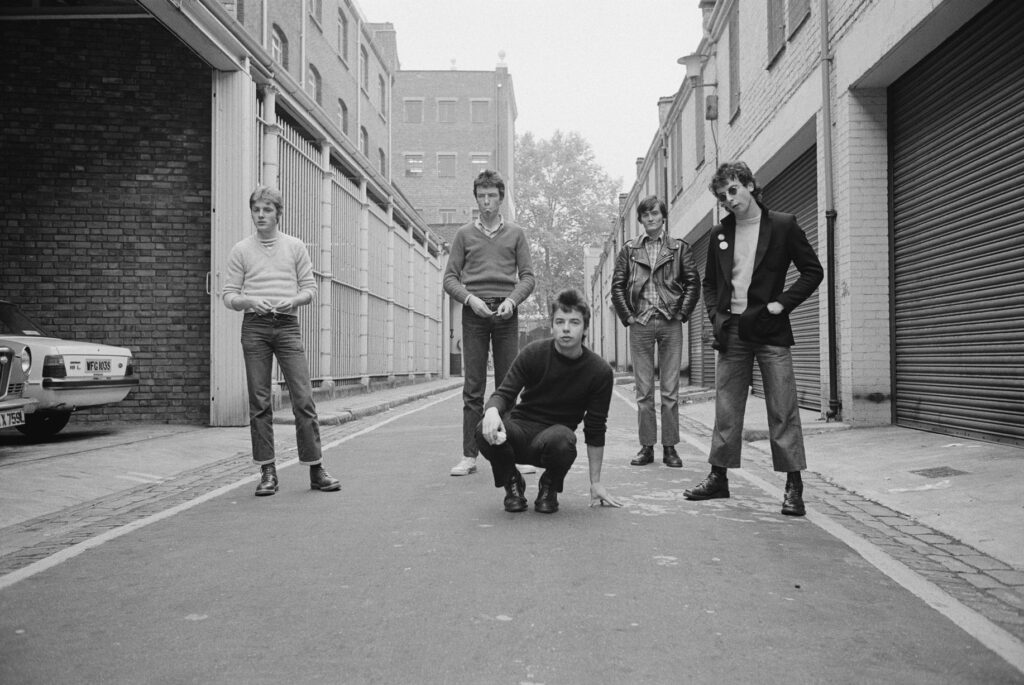
At the time, we had no confidence. We wouldn’t have even thought of asking for someone who produced one of the records we liked because we would have naturally thought that they wouldn’t have wanted to do us anyway.
So, we ended up with Roger Béchirian. He was the engineer on the Elvis Costello stuff. He came to see us live, and he offered to do the record, so we thought ‘he really likes us, so we might as well go with him’, and it turned out pretty good at the start.
Where did the lack of confidence come from?
It used to be when we were getting good reviews. I remember the first NME review when the first LP – it was done at the same time as Stiff Little Fingers’ LP – and it was all this thing of coming from war-torn Northern Ireland and everything. We were proud of coming from Derry, but we always felt that it was getting the sympathy vote. We were always very self-conscious about people just feeling sorry for us because we came from the north of Ireland, rather than taking us seriously as a band. That’s maybe one of the reasons that we steered clear of the political situation a bit.
We were always trying to be as good as Television or the New York Dolls. We were trying to write great pop songs. But we always felt we were never as good as anybody else; that was just our nature. We were quite self-deprecating, really, I suppose.
Did that continue even when you’re recording albums and appearing on Top of the Pops?
It did because when we were on Top on the Pops, we still lived in Derry the whole time; we never left Derry until after we broke up. That was part of our whole idea and punk ethos – to stay with your community.
But, unfortunately, apart from maybe 60, 70 people that came to see us at The Casbah, we were like a joke in Derry. You couldn’t walk down to the town [without] people being, ‘fucking shite Undertones’ or ‘what crap’s that Jimmy shite’ and all this stuff, you know. We were just a joke band in Derry at the time, even when we were on Top of the Pops and stuff.

Derry was all heavy metal and progressive rock and all that stuff. Because we weren’t doing five-minute guitar solos, we were just [seen as] crap musicians, so we had to take on the chin.
And has that all changed now?
Now we’re lionised by all those people that used to slag us off – ‘Undertones, one of the great bands’ and all that stuff, it’s ironic. People probably didn’t understand why we were on Top of the Pops one minute and then walking about the town and buying a paper or whatever, and people are going ‘I thought they were pop stars, but they’re not all that’ sort of thing.
There was never anybody on Top of the Pops that came from Derry. We were just lucky to be in the right place at the right time, obviously thanks to John Peel.
So, how important was John Peel to The Undertones?
If John Peel hadn’t played ‘Teenage Kicks’, we were probably going to break up. We’d sort of set the goal to make a record, and we didn’t think we were all that great anyway. If that record had come out and done nothing, we would have just broken up.
Do you remember writing ‘Teenage Kicks’?
I do, yeah. We used to play in the Casbah every two weeks, and we always set a goal to try and have a cover version – mainly from Nuggets – and add a new song as well. [That] give me the motivation to try and get a new song. I remember around the summertime, I was sitting down, and I got the title, and I thought, ‘it sounds like it a good title’. But these were the days before Google, so I wasn’t sure there wasn’t a song called that already. And then the song more or less just wrote itself from the title.
We absolutely thought it was a good song, but we always thought ‘True Confessions’ was a better song on the EP. But we were teenagers, calling it the ‘Teenage Kicks’ EP seemed the most sensible thing and having that as the first song. To be honest, when we got the record, the test pressing, we thought that it sounded terrible, whereas now you hear it, and it still sounds amazing.
How did the sound let you down at the time?
Well, I really just thought it sounded a bit thin, and the guitars sounded a bit rough, but of course, they sound amazing. We probably should have recorded the whole LP at that time, and it would have been far better than the first LP turned out, you know, very raw and more punky, I suppose and less poppy. But you can’t change things, and it is what it was, and obviously, we were reasonably successful those first four years.
And now ‘Teenage Kicks’ has taken on a life of its own.
Once, sadly, John Peel died, it seemed to just become this whole new life and [when] people think of John Peel, they immediately think of ‘Teenage Kicks’. It’s something that we are so humbled by, to be mentioned in the same breath as John Peel; it’s something really nice.
And how do you now view the last albums from the original Undertones as your sound became more complex?
‘Positive Touch’, ‘Sin of Pride’, those two, we were moving away from the kinda Ramones influence that you can hear on the first LP and to be honest, we should have probably stuck to that, you know. ‘Positive Touch’ and ‘Sin of Pride’ have really good songs, but they didn’t sell, and it wasn’t what Undertones fans wanted to hear.

Our intention was never to be rich and famous anyway; we just wanted to do what we wanted to do. But that, eventually, was what led to Feargal leaving the band. ‘Sin of Pride’ just bombed, and that was the death knell as far as Feargal was concerned. He knew he could probably do something better – which obviously proved to be the case.
Looking back on that first period of The Undertones, what are your favourite memories?
Recording was always my favourite thing. Being in the studio and as a newer band, it was a time you can try it new things – that’s the best memories I have. We recorded ‘Hypnotised’ and ‘Positive Touch’ in studios just outside Amsterdam. It was like a house sort of place – lovely, lovely memories of that time. My wife was over, where we were staying we were able to meet for dinner in the studio afterwards, it’s just a lovely memory, probably that’s my favourite.
What was it like touring in the US with The Clash?
That was amazing. See, they were supposed to come over to Derry – we were trying to hold a live music festival and played some shows in The Marquee in London, and the money from that was going to pay for this live festival. The Clash had agreed to do it, The Dammed and The Boys, I think. And then The Clash had just been to Belfast, and Joe Strummer was wearing a ‘smash the H-Blocks’ t-shirt – the H-Blocks were where the IRA and Republican prisoners were held – and he started receiving death threats. He was getting letters from the loyalist organisations saying, ‘you set foot in the north of Ireland, you’re going to get shot’.
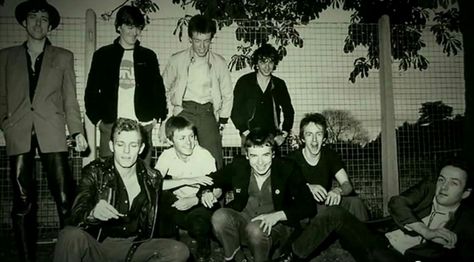
So, he called off [playing the festival], and he said to meet him. They were in the middle of recording ‘London Calling’, and we were in London at that time recording as well, so he invited us round to meet them in the studio. Watching them record those songs on ‘London Calling’, that was a thrill in itself. And then he showed us the letters and said, ‘I just can’t take a chance’, we understood. So the festival was called off, but I think maybe he felt sorry that he couldn’t do it and he offered us a slot on their American tour when they were promoting ‘London Calling’. And that was to play six weeks, I think, the whole tour possibly, but we didn’t want to be away from our wives and families for that long, so we just did the three weeks.
“Joe Strummer was wearing a ‘smash the H-Blocks’ t-shirt and he started receiving death threats. He was getting letters from the loyalist organisations saying, ‘you set foot in the north of Ireland, you’re going to get shot’.” John O’Neill, The Undertones.
Tweet
That was amazing, and we learnt a lot just watching them – the set-up they had and how professional they were. At that stage, when we used to play live, we didn’t even have a setlist. They had a setlist, and they stuck to it, and it made them so tight. That was one of the lessons that we learnt from watching them, that it was a good idea to have a setlist after all – because we used to go, ‘what song are we going to do next’ when we finished one song. Everything was very ad-hoc. And they were such lovely, genuinely nice people.
Years later, you reformed for the reopening of Derry’s multimedia arts hub, The Nerve Centre, in 1999. How did that bring you back together?
We were asked a few times over the years previously to reform, and we just thought, ‘nah’. We did meet up with John Peel for his 50th birthday; that would have been ’89, I think it was. We met Feargal for the first time then anyway, and it was just very awkward and horrible, so anytime anybody asked us to reform to do something, we just thought, ‘no, it wouldn’t be true to ourselves to do it, and we’d just be going through the motions’.
In ’99, when The Nerve Centre asked for us, we just thought, ‘well, let’s go down and have a practice just the four of us, see how it goes’. And we were knocked out how everything sounded so great. So, we thought, ‘well, we’ve got to get a singer in, we don’t want Feargal, so we’ll try and get somebody else in’. Billy had been in a band previously with Paul, and I knew Paul through [working at] The Nerve Centre as well, so he seemed an obvious choice to try, and it just gelled perfectly.

What was going to be a one-off gig has lasted a little longer, and more than 20 years later, the band’s still going. Is this version of the band fully accepted, do you think?
It’s sad. We’re still up against this thing because we’re called The Undertones, but it doesn’t have Feargal Sharkey on it, that there’s still some people kind of treat it negatively, you know, which is a shame for Paul, you know, but we made the choice when we reformed to keep the name The Undertones because obviously, we wrote all the songs initially anyway.
We didn’t think there was any need to change it, just because Feargal wasn’t in the band, even though he was seen as being the frontman. Generally, most people think of the lead singer in the band as the leader in the band – in our case, that wasn’t the way it was really, but unfortunately, a lot of people still regard it as that, we’re kind of saddled with it whenever we do something new.
Prior to getting together with Paul, did you consider talking to Feargal about him joining you?
No, never an option.
Because we have the same manager, we’ve had to do a few Zoom calls because of contractual things over the last couple of years. Feargal, I don’t know; he’s been out of Derry for so long, I don’t think he has any connections [with the place]. It’s all very tart, a bit cold when we talk to him, so [we] just leave it as it is.
We wouldn’t want to be doing this unless it was fun, and the fact that we’ve been doing it for this long shows just how much fun we do have. If you’ve ever seen us live, it’s just loads of smiling faces.
‘Dig What You Need’ is released on 11 March on Dimple Discs, and The Undertones are on tour in the UK and Europe from 10 March.

‘Dig What You Need’ is released on 11 March on Dimple Discs, and The Undertones are on tour in the UK and Europe from 10 March.
PRE ORDER ‘Dig What You Need‘ HERE
The Undertones 2022 Tour Dates In Full
March 10 – Sheffield, UK @ Leadmill
*11 – Northampton, UK @Roadmender
^12 – London, UK @ Electric Ballroom
^17 – Brighton, UK @ Chalk
^18 – Frome, UK @ Cheese & Grain
^19 – Cardiff, UK @ Cardiff SU Great Hall
^31- Newcastle, UK @ Boiler Shop ^
April 01 – Manchester, UK @Academy –
^02 – Liverpool, UK @ O2 Academy
^09 – Munich, Germany @ Feierwerk
10 – Weinheim, Germany @ Cafe Central
22 – Dublin, Ireland @ Academy
May13 – Bremen, Germany @ Kulturzentrum Lagerhaus
14 – Düsseldorf, Germany @ Zakk
15 – Hamburg, Germany @ Markethalle
17 – Malmo, Sweden @ Plan B18 – Oslo, Norway @ Vulkan Arena
20 – Göteborg, Sweden @ Pustervik
21 – Stockholm, Sweden @Slaktkykan
22 – Copenhagen, Denmark @ Pumpenhuset
*Special guest Neville Staple Band
^Special guest Hugh Cornwell Electric
Tickets available from : https://www.bandsintown.com/a/17292-the-undertonesThe Undertones are: John O’Neill – guitar Michael Bradley – bass guitar, backing vocals Billy Doherty – drums Damian O’Neill – guitar, backing vocals Paul McLoone – lead vocals
Main photo: The Undertones performing on the BBC TV show ‘Top Of The Pops’, circa 1980. Left to right- John O’Neill, Damian O’Neill, Michael Bradley, Feargal Sharkey and Billy Doherty. (Photo by Michael Putland)
Follow The Undertones
Need more punk in your life?
- Baby Strange Resurfacing For UK Headlining Dates
- Crown The King release title track from debut EP ‘Groundhog Day’
- James Domestic releases ode to getting things done…tomorrow
- With Their New Single, ‘Headstone’, Weatherstate Remind Us That Life Is Short.
- Out of the gate like a Brahman bull comes East Bay’s ‘Charger’ with power driven new album
- Green Day Taunt Fans With ‘1972’ Teasers
- Book Launch: ‘The Paradiso Punk Years’
- Simple Plan Drops New Video For ‘The Antidote’
- Henry Rollins Cancels Spoken Word Tour
- Travis Barker gives Adele a pop-punk injection
- Tiny Desk Concert Goes Hardcore
- Chris Nine unleashes spirited track ‘Ghosts’ to confront relationships past
- One Hidden Frame release third single from upcoming album
An occasional writer on punk rock.
Click on Dom’s photo for more of his articles

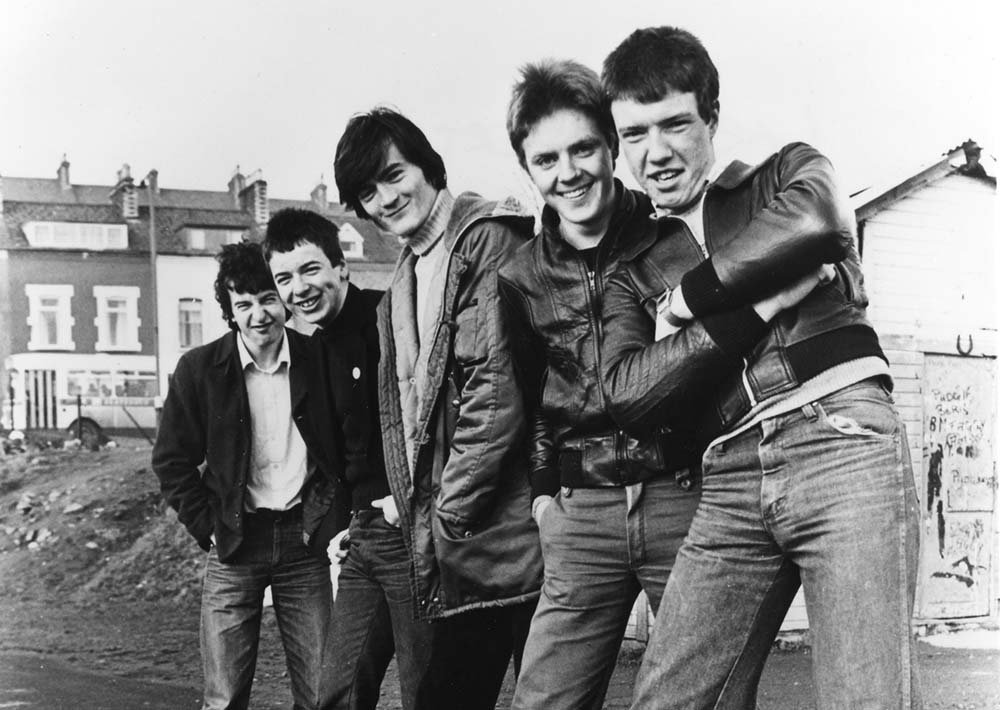




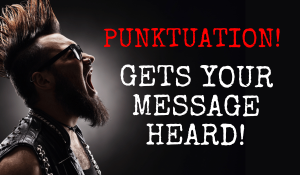
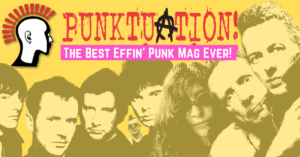 Did you know that we are 100% DIY? We run our own game. No one dictates to us, and no one drives what we can or cannot put on our pages – and this is how we plan to continue!
Did you know that we are 100% DIY? We run our own game. No one dictates to us, and no one drives what we can or cannot put on our pages – and this is how we plan to continue!